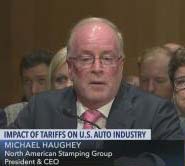No American industry is lobbying hard for them. Most economists think they’re a bad idea. Even some trade hawks in President Donald Trump’s administration see them as a roadblock in his overhaul of the global trading system.
That’s helps explain why tariffs on imported vehicles and auto parts—the next possible salvo in Trump’s trade war—are causing auto-parts supplier Michael Haughey to hold back on any major expansion right now.

By Sunday, the Commerce Department will deliver to Trump the results of an investigation into whether the U.S. car imports stemming from the decades-long push toward a global automotive industry represent a threat to national security. Commerce Secretary Wilbur Ross can recommend options for the president, potentially leading to levies of as much 25 percent on imported vehicles and parts.
They’re tariffs hardly anyone seems to want.
“You cannot find a corner of this industry that thinks this is a good idea,” said John Bozzella, president of the Association of Global Automakers, the main group for overseas-based carmakers lobbying against new tariffs.
The automakers’ opposition stands in stark contrast with American steel producers and steelworker unions, whose calls for trade protections led to new levies on imports of the metals last year under the same trade powers Trump is using to examine autos.
Automakers, parts suppliers and economists predict dire consequences for the U.S. economy, in part because of the industry’s massive reach.
The auto industry makes up about 8 percent of global trade, compared with the slightly more than 3 percent represented by the bilateral trade between the U.S. and China, according to the World Trade Organization. The U.S. imported more than $191 billion in passenger cars and light trucks in 2017, the last full year of data available, and exported $56.9 billion worth. It imported almost $149 billion in parts and had exports valued at $86.6 billion.
The Trump administration argues that cars are a valid target for national-security tariffs because it sees “economic security” as a key element to safeguard the nation. It also points to the discrepancy in U.S. tariffs with the rest of the world. “Why is it that Europe gets to charge us 10 percent to try to sell them a Ford or a GM automobile and they get 2.5 percent? I mean, that’s insane,” White House trade adviser Peter Navarro said in November.
Proponents within the administration see auto tariffs as a way to force repatriation of supply chains and re-shoring of the parts manufacturing they argue has left the U.S. too dependent on countries such as China for key components.
That, they contend, is particularly important when it comes to nurturing emerging technologies such as electric vehicles that it’s already been protecting aggressively. Among the first wave of tariffs imposed on China last year were 25 percent duties on electric cars and buses, plus motors and other parts.
But the tariffs have also faced internal opposition within the Trump administration. U.S. Trade Representative Robert Lighthizer has been trying to delay a decision, arguing that rolling out the tariffs would scupper his attempt to close trade deals with the European Union and Japan, according to people familiar with internal discussions.
Production Costs
Economists argue that rather than strengthen the U.S. industry, tariffs would simply raise the cost of production and, in the long term, may push domestic carmakers to shift even more production offshore.
A 2018 study by the Peterson Institute for International Economics found that global retaliatory tariffs in response to a new 25 percent U.S. levy on autos and parts from all countries including Canada and Mexico would cause a bigger fall in U.S. exports than imports, reduce domestic production by almost 4 percent and lead to 624,000 U.S. job losses.
That’s in part because the auto parts business is increasingly global, with most vehicles produced in the U.S. assembled from components sourced from around the world.
General Motors Co., Ford Motor Co., Fiat Chrysler Automobiles NV, Tesla Inc. and Honda Motor Co. each imported less than 10 percent of the vehicles they sold in the U.S. last year from outside North America. They would suffer the least from vehicle tariffs and could be in a position to benefit from their rivals’ pain.
Still, the companies argue against steep levies, warning they would ravage U.S. payrolls, stifle domestic investment and raise new-car prices. “There would be no winners,” said Matt Blunt, president of the Washington-based American Automotive Policy Council, which lobbies on behalf of GM, Ford and Fiat Chrysler.
Trade used to be one of the few areas where the Detroit Three saw eye-to-eye with big labor. Today, the issue separates them.
The United Auto Workers, which represents nearly a half-million members in the U.S., stands out as one of the few groups that has signaled any degree of support for the Commerce Department’s investigation, calling it “long overdue.”
Aside from the economics, it’s a tough call for Trump politically. David Britt, chairman of the economic development committee for Spartanburg County Council in South Carolina, says he voted for Trump. But he’s pleaded with the president in a letter and through Senate testimony not to proceed with the tariffs.
Spartanburg is home to a BMW plant that employs 10,000 workers and has suppliers with about 70,000 workers across the state, Britt said. “I’m hoping and praying he will listen,” he said of Trump.










